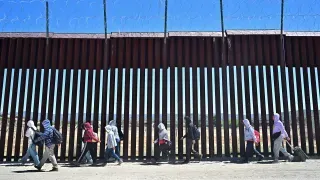The incoming Trump administration is reportedly drafting plans to deport migrants whose home countries refuse to accept them to third-party nations, including Turks and Caicos, the Bahamas, Panama, and Grenada, according to sources familiar with the matter.
This proposed policy could result in thousands of migrants being sent to countries where they have no ties, language familiarity, or cultural connections, raising concerns among human rights organizations and foreign governments.
The initiative is intended to address long-standing challenges in deporting migrants from countries like Venezuela, Cuba, and China, which often resist repatriation. To circumvent legal restrictions on prolonged detention in the U.S., the Trump administration is exploring agreements with third-party nations to accept deportees.
The plan also pressures Mexico to accept non-Mexican deportees, using potential tariffs as leverage to gain compliance. Mexico has already rejected this proposal, with President Claudia Sheinbaum emphasizing solidarity with migrants but stating, “Our principal function is to receive Mexicans.”
Similarly, the Bahamas’ Prime Minister, Philip Davis, has firmly refused the proposal, citing insufficient resources to accommodate migrants from other countries.
This is not the first time such a policy has been attempted. During Trump’s first term, a limited program deported asylum seekers to Guatemala under a bilateral agreement, often without their prior knowledge. That policy faced significant backlash and was halted during the pandemic.
The American Civil Liberties Union (ACLU), which challenged the earlier policy, has voiced opposition to the current proposal. “We sued over this type of policy during the first Trump administration because it was illegal and put asylum-seekers at grave risk,” said Lee Gelernt, an ACLU attorney.
Critics argue that deporting migrants to third-party nations violates international human rights norms and puts deportees in precarious situations. The Bahamas, Panama, and other nations have indicated reluctance or outright refusal to cooperate.
The Trump transition team has yet to confirm how it plans to incentivize or pressure nations to accept deportees. However, the administration has outlined a broader goal of expediting deportations within one week of arrest, as part of what President-elect Trump has described as “the largest deportation operation in American history.”
Pro-immigrant organizations have warned of the potential for human rights violations. “Displacing individuals to countries they have no connection to is not only unethical but also exposes them to immense risks,” said a spokesperson from Human Rights Watch.
This policy, if implemented, could strain U.S. relations with countries in the Caribbean and Central America, many of which lack the infrastructure to support large numbers of displaced individuals. Critics warn of potential humanitarian crises and increased tensions with allies.
As the Trump administration prepares to take office in January, the international community and human rights advocates will closely monitor how this controversial plan unfolds.

